 In an attempt to get right on down with the online world, Nokia has unveiled a blog relations campaign for its new N90 phone, offering information and podcasts about the handset to bloggers.
In an attempt to get right on down with the online world, Nokia has unveiled a blog relations campaign for its new N90 phone, offering information and podcasts about the handset to bloggers.
The campaign – dreamt up by the Californian-based marketing firm Comunicano – aims to get bloggers spreading the word about the phone by offering a separate press room ( the ‘Nokia Nseries N90 Blogger Relations Blog site’, in fact).
The site will offer blog authors, “blogger and media information that you can repurpose and utilise in your blog postings about the N90.”
CEO Andy Abramson explained that the campaign was all about treating bloggers like any member of the press – and Nokia were happy to go along with that by dishing out N90 phones to 50 bloggers for review.
“Bloggers are often treated like publicists treat the paparazzi in Hollywood; they’re used when they’re wanted, or looked at like something at the bottom of the shoe when they’re not,” insisted Abramson.
Employing more cunning than a crafty fox in a shifty suit, Abramson reckons that bloggers could be the perfect vehicle for drumming up free publicity for a product.
 “Since bloggers are articulate, passionate, and prolific – and have more space to write in than a newspaper columnist – they can yield incredible dividends,” enthused Abramson.
“Since bloggers are articulate, passionate, and prolific – and have more space to write in than a newspaper columnist – they can yield incredible dividends,” enthused Abramson.
“If one blogger has a question, there might be 10 others who have the same question,” he added.
Although Nokia’s press room provides much the same stuff that you can find on their regular website, the company are hoping that bloggers will be find it easier to grab promotional material off the blog site for slapping up on their own sites.
The site itself runs a blog maintained by Abramson and it’s every bit as enthusiastic about the product as you might imagine, serving up glowing snippets from bloggers who have reviewed the N90.
Ever keen to tempt users with new content, the new Podcast service invites bloggers to record a Podcast with a ‘Nokia Representative’ to stick on their own site.
There’s already a few examples up there, but we really couldn’t bring ourselves to click on the one about a reggae band with the toe-curlingly bad title, “JA..The N90 Is So Cool Mon!”
 Try as we might, us cynical folks at Digital Lifestyles couldn’t shake off a nagging suspicion that the marketing world’s new-found enthusiasm for blogs is more about trying to control and coerce what’s been written about their products in the blogosphere.
Try as we might, us cynical folks at Digital Lifestyles couldn’t shake off a nagging suspicion that the marketing world’s new-found enthusiasm for blogs is more about trying to control and coerce what’s been written about their products in the blogosphere.
With the explosive growth in blogging – and the increased prominence of blog entries in search engine results – companies are keen to try and manage what’s been said about their products, and we see that Blogger Relations Blog could be the start of a slippery slope, with influential blogs being targeted by marketing campaigns.
Companies who follow this type of idea had better take care as they’re walking on a tightrope. Bloggers are a canny bunch, and if they feel like they’re getting played – they’re going to make a whole lot of noise, jumping up and down, screaming about it. Not a pretty sight and definitely not what your brand needs.
Nokia clearly feel there’s considerable mileage to be gained from this blogging lark and have already announced plans for similar campaigns for its N71 and N91 series.
Nokia n90 Blog
 NBC Universal and Apple have struck a deal to make NBC-owned television shows, such as “The Office” and “Law & Order,” available on the iTunes music store.
NBC Universal and Apple have struck a deal to make NBC-owned television shows, such as “The Office” and “Law & Order,” available on the iTunes music store.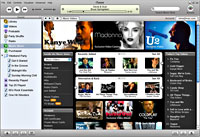 The shows will be available from next week, downloadable from the iTunes Music Store the day after they air for $1.99 (£1.15, €1.70) per episode
The shows will be available from next week, downloadable from the iTunes Music Store the day after they air for $1.99 (£1.15, €1.70) per episode In an attempt to get right on down with the online world, Nokia has unveiled a blog relations campaign for its new N90 phone, offering information and podcasts about the handset to bloggers.
In an attempt to get right on down with the online world, Nokia has unveiled a blog relations campaign for its new N90 phone, offering information and podcasts about the handset to bloggers. “Since bloggers are articulate, passionate, and prolific – and have more space to write in than a newspaper columnist – they can yield incredible dividends,” enthused Abramson.
“Since bloggers are articulate, passionate, and prolific – and have more space to write in than a newspaper columnist – they can yield incredible dividends,” enthused Abramson.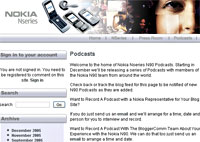 Try as we might, us cynical folks at Digital Lifestyles couldn’t shake off a nagging suspicion that the marketing world’s new-found enthusiasm for blogs is more about trying to control and coerce what’s been written about their products in the blogosphere.
Try as we might, us cynical folks at Digital Lifestyles couldn’t shake off a nagging suspicion that the marketing world’s new-found enthusiasm for blogs is more about trying to control and coerce what’s been written about their products in the blogosphere.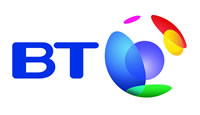 BT have been enjoying government payouts to maintain their networks.
BT have been enjoying government payouts to maintain their networks.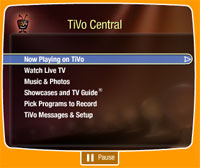 TiVo has announced that it plans to offer the first TV-based advertising “search solution” early next year.
TiVo has announced that it plans to offer the first TV-based advertising “search solution” early next year. With punters able to search for products by category or associated keywords, TiVo sees big benefits for advertisers (obviously) and punters looking for information on products or services.
With punters able to search for products by category or associated keywords, TiVo sees big benefits for advertisers (obviously) and punters looking for information on products or services. Supping deeply on a morning brew of Buzzword Coffee, Tracey Scheppach, VP, Video Innovations Director at Starcom, enthused “The new TiVo application will provide both a needed platform for consumers to seek out relevant, searchable commercial content and an environment for advertisers to engage highly desirable and motivated consumers…it’s the first of its kind in the industry, and a platform that is clearly needed in this challenging advertising marketplace.”
Supping deeply on a morning brew of Buzzword Coffee, Tracey Scheppach, VP, Video Innovations Director at Starcom, enthused “The new TiVo application will provide both a needed platform for consumers to seek out relevant, searchable commercial content and an environment for advertisers to engage highly desirable and motivated consumers…it’s the first of its kind in the industry, and a platform that is clearly needed in this challenging advertising marketplace.” Google is testing a potentially lucrative sales tool that allows users to ring up advertisers located through a Google search – for free.
Google is testing a potentially lucrative sales tool that allows users to ring up advertisers located through a Google search – for free. Moreover, they claim that the number will be blocked from the advertiser during the call, with Google promising to delete the number from their servers after a short period of time.
Moreover, they claim that the number will be blocked from the advertiser during the call, with Google promising to delete the number from their servers after a short period of time. As we
As we  It could be, that time will prove TiVo have announced prematurely this new augmentation, without fully taking account of the wide ranging business and legal implications. But in this fast moving sector, innovation is a necessity rather than an option.
It could be, that time will prove TiVo have announced prematurely this new augmentation, without fully taking account of the wide ranging business and legal implications. But in this fast moving sector, innovation is a necessity rather than an option. The Next Revolution Is Here… Or Is It?
The Next Revolution Is Here… Or Is It?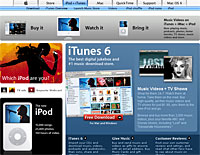 Apple’s iTunes online store has been ranked the seventh-largest music retailer in the US in the third quarter, charging into the top 10 for the first time.
Apple’s iTunes online store has been ranked the seventh-largest music retailer in the US in the third quarter, charging into the top 10 for the first time. Already eating iTunes’ dust are big names like Tower Records and Borders, reflecting music fans’ growing passion for online music.
Already eating iTunes’ dust are big names like Tower Records and Borders, reflecting music fans’ growing passion for online music. Combined revenue from the iPod, Apple’s fastest- selling product, and iTunes music accounted for a massive 40 percent of sales last quarter, up from 27 percent a year earlier.
Combined revenue from the iPod, Apple’s fastest- selling product, and iTunes music accounted for a massive 40 percent of sales last quarter, up from 27 percent a year earlier. TiVo have announced the release of new software, slated for the first quarter of 2006 that will let owners watch recorded television shows on their Sony PSPs and video iPods.
TiVo have announced the release of new software, slated for the first quarter of 2006 that will let owners watch recorded television shows on their Sony PSPs and video iPods. This development is a further blow to TV network schedulers and their much-relied on conventional prime time programmes. This theory is torn apart when mobile viewers are able to watch programmes recorded the previous night, on the go.
This development is a further blow to TV network schedulers and their much-relied on conventional prime time programmes. This theory is torn apart when mobile viewers are able to watch programmes recorded the previous night, on the go.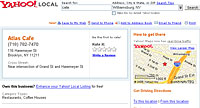 Using search engines has become the second most popular activity for Web users, according to new research from the Pew Internet & American Life Project.
Using search engines has become the second most popular activity for Web users, according to new research from the Pew Internet & American Life Project. ‘Gen X’ surfers (29-40 year olds, not the Billy Idol-fronted band) were online the most (51 per cent), followed by ‘Gen Y’ users (18-28 year olds), ‘Older Baby Boomers’ (51-59 yrs old), ‘Younger Baby Boomers’ (41-50), ‘Matures’ (60-69) and, finally ‘After work’ (70+). We wonder who makes up these daft categories?
‘Gen X’ surfers (29-40 year olds, not the Billy Idol-fronted band) were online the most (51 per cent), followed by ‘Gen Y’ users (18-28 year olds), ‘Older Baby Boomers’ (51-59 yrs old), ‘Younger Baby Boomers’ (41-50), ‘Matures’ (60-69) and, finally ‘After work’ (70+). We wonder who makes up these daft categories?